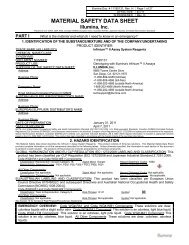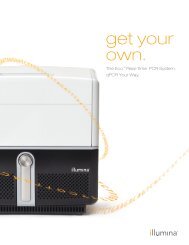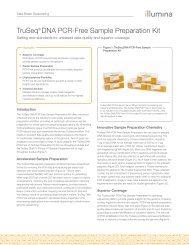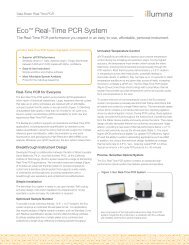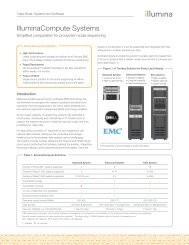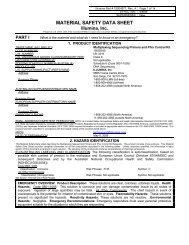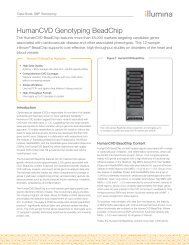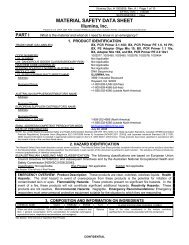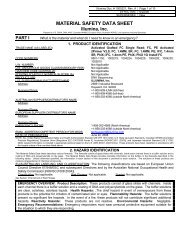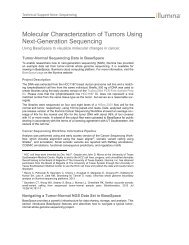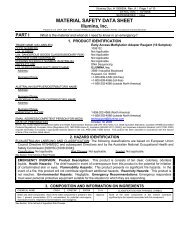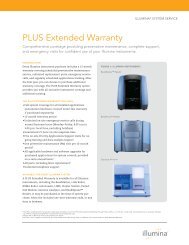Illumina Ovine SNP Chip to Spur New Round of Association Studies
Illumina Ovine SNP Chip to Spur New Round of Association Studies
Illumina Ovine SNP Chip to Spur New Round of Association Studies
Create successful ePaper yourself
Turn your PDF publications into a flip-book with our unique Google optimized e-Paper software.
“We also plan <strong>to</strong> aim <strong>to</strong> move from draft <strong>to</strong> a reference genome sequence for sheep<br />
heading for as high-quality, close <strong>to</strong> complete sequence as possible,” he added.<br />
Dalrymple added that, as more information becomes available, ISGC participants will be<br />
able <strong>to</strong> access it <strong>to</strong> create “smaller, more focused-trait selection arrays” <strong>to</strong> aid in their<br />
studies.<br />
<strong>New</strong> Zealand<br />
Meantime, in <strong>New</strong> Zealand, the nation’s AgResearch institute hopes <strong>to</strong> genotype several<br />
thousand sheep by summer using the <strong>Ovine</strong><strong>SNP</strong>50, according <strong>to</strong> John McEwan, a senior<br />
scientist at the publicly funded research organization.<br />
“The primary reason that the <strong>Illumina</strong> <strong>SNP</strong> chip was developed is for whole-genome<br />
selection in sheep,” McEwan <strong>to</strong>ld BioArray <strong>New</strong>s this week. “It can also be used for<br />
understanding mutation, breed diversity, [and] helping create linkage maps <strong>of</strong> the<br />
genome, but the primary reason and the vast amount <strong>of</strong> money was invested [<strong>to</strong> make this<br />
chip] because the sheep industry in <strong>New</strong> Zealand wants <strong>to</strong> do whole-genome selection<br />
just like the dairy industry does.”<br />
McEwan said that AgResearch has already genotyped 3,000 sheep and hopes <strong>to</strong> type up<br />
<strong>to</strong> 2,500 additional animals by July. “Our hope is that we will have analyzed those results<br />
and have some commercial tests available in a year’s time” for animal selection, he said.<br />
Any potential tests that come out <strong>of</strong> AgResearch’s association study will be <strong>SNP</strong>-based<br />
and will probably make use <strong>of</strong> the <strong>Illumina</strong> Bead<strong>Chip</strong> or Sequenom MassArray<br />
platforms, both <strong>of</strong> which AgResearch has at its campus in Dunedin. McEwan said that in<br />
the past AgResearch has developed microsatellite and <strong>SNP</strong>-based tests for bovine<br />
selection.<br />
According <strong>to</strong> McEwan, there is “significant” demand for new genetic tests for animal<br />
selection in <strong>New</strong> Zealand, adding that up <strong>to</strong> 10 percent <strong>of</strong> export GDP in the country is<br />
related <strong>to</strong> the sheep industry.<br />
“If you put a ring around sheep and dairy products, you are talking about a very<br />
substantial part <strong>of</strong> <strong>New</strong> Zealand’s income,” McEwan said. “For those reasons, this is<br />
quite an important industry <strong>to</strong> <strong>New</strong> Zealand. An increase in productivity could make a<br />
substantial contribution <strong>to</strong> GDP.”<br />
McEwan said that current selection technologies rely on older techniques like Western<br />
blot <strong>to</strong> identify phenotype and mutation information. With the new <strong>Illumina</strong> chip,<br />
AgResearch hopes <strong>to</strong> identify markers for traits that have been his<strong>to</strong>rically hard <strong>to</strong> select<br />
but that are very important, such as “longevity <strong>of</strong> the ewe, feed intake <strong>of</strong> the ewe,<br />
reproductive ability, how well it milks, disease traits,” and others.



